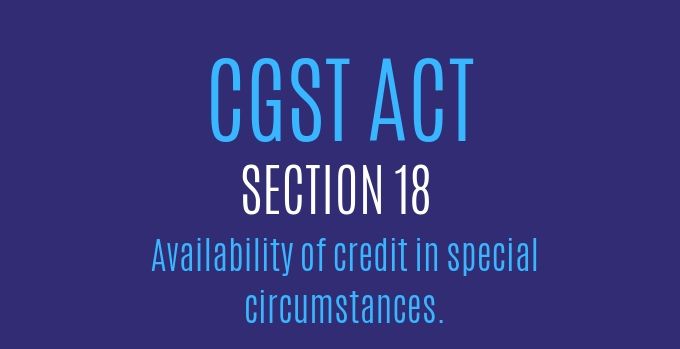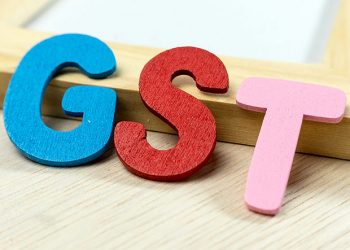Many of us start business and then we apply for GST registration after we have crossed the threshold limit i.e. Rs. 20 lakh for supply of services and Rs. 40 lakh for supply of goods but till then we purchase goods from supplier who charge us GST and it becomes our cost and people are confused whether they can take credit of such goods which they had purchased when they were not registered under GST? In this post we are going to discuss the same issue.
There are two major requirement for claiming ITC on goods purchased:
- You must have a valid tax invoice.
- The input tax credit must match the GST credit available in GSTR 2A.
Now let’s see whats a valid tax invoice is:
A valid tax invoice must contain:
- Name, address and GSTN of supplier.
- A consecutive serial number.
- Date of issue
- Name, address and GSTN or UIN, if registered of the recipient.
- Name and address of the recipient and the address of the delivery along with the name of the state and its code, if such recipient is unregistered and where the value of taxable supply is fifty thousand rupees or more.
- HSN code of goods or SAC code of services.
- Description of goods.
- Quantity of goods and unit or UQC
- Total value of goods and service.
- Taxable value of goods or service after considering discount.
- Rate of Tax.
- Amount of tax charged for taxable goods or services.
- Place of supply in case of a supply in the course of inter state trade or commerce.
- Whether the tax is payable on reverse charge basis.
- Signature or digital signature of the owner or authorized signatory.
Now since you wouldn’t have provided your GST number while purchasing the goods so the credit wont be available in your GSTR 2A. However since you will be in the possession of the valid tax invoice as mentioned above you can claim credit of atleast 20% of such goods and services as provided by new amendment, whereas earlier it was possible that if you have a valid invoice you can claim entire credit.
In case where you have purchased the goods and in same month you have applied for registration then in such case you can ask the supplier to amend his Invoice but what to do in other situations?
Now Section 18 of the CGST Act, 2017 prescribes special circumstances where input tax credit can be claimed in special circumstances which is as follows:
“(1) Subject to such conditions and restrictions as may be prescribed—
(a) a person who has applied for registration under this Act within thirty days from the date on which he becomes liable to registration and has been granted such registration shall be entitled to take credit of input tax in respect of inputs held in stock and inputs contained in semi-finished or finished goods held in stock on the day immediately preceding the date from which he becomes liable to pay tax under the provisions of this Act;
(b) a person who takes registration under sub-section (3) of section 25 shall be entitled to take credit of input tax in respect of inputs held in stock and inputs contained in semi-finished or finished goods held in stock on the day immediately preceding the date of grant of registration;
(c) where any registered person ceases to pay tax under section 10, he shall be entitled to take credit of input tax in respect of inputs held in stock, inputs contained in semi-finished or finished goods held in stock and on capital goods on the day immediately preceding the date from which he becomes liable to pay tax under section 9: Provided that the credit on capital goods shall be reduced by such percentage points as may be prescribed;
(d) where an exempt supply of goods or services or both by a registered person becomes a taxable supply, such person shall be entitled to take credit of input tax in respect of inputs held in stock and inputs contained in semi-finished or finished goods held in stock relatable to such exempt supply and on capital goods exclusively used for such exempt supply on the day immediately preceding the date from which such supply becomes taxable: Provided that the credit on capital goods shall be reduced by such percentage points as may be prescribed.
(2) A registered person shall not be entitled to take input tax credit under sub-section (1) in respect of any supply of goods or services or both to him after the expiry of one year from the date of issue of tax invoice relating to such supply.
(3) Where there is a change in the constitution of a registered person on account of sale, merger, demerger, amalgamation, lease or transfer of the business with the specific provisions for transfer of liabilities, the said registered person shall be allowed to transfer the input tax credit which remains unutilised in his electronic credit ledger to such sold, merged, demerged, amalgamated, leased or transferred business in such manner as may be prescribed.
(4) Where any registered person who has availed of input tax credit opts to pay tax under section 10 or, where the goods or services or both supplied by him become wholly exempt, he shall pay an amount, by way of debit in the electronic credit ledger or electronic cash ledger, equivalent to the credit of input tax in respect of inputs held in stock and inputs contained in semi-finished or finished goods held in stock and on capital goods, reduced by such percentage points as may be prescribed, on the day immediately preceding the date of exercising of such option or, as the case may be, the date of such exemption: Provided that after payment of such amount, the balance of input tax credit, if any, lying in his electronic credit ledger shall lapse.
(5) The amount of credit under sub-section (1) and the amount payable under sub-section (4) shall be calculated in such manner as may be prescribed.
(6) In case of supply of capital goods or plant and machinery, on which input tax credit has been taken, the registered person shall pay an amount equal to the input tax credit taken on the said capital goods or plant and machinery reduced by such percentage points as may be prescribed or the tax on the transaction value of such capital goods or plant and machinery determined under section 15, whichever is higher: Provided that where refractory bricks, moulds and dies, jigs and fixtures are supplied as scrap, the taxable person may pay tax on the transaction value of such goods determined under section 15.”
Point (a) of the above section deals with our situation and allows assessee to take credit, however we need to also understand that while filing return it wont be possible to claim such credit because as per rules to claim credit same amount must be available in GSTR 2A and thus you may have to undergo litigation to get such credit and you should also maintain proper stock register to prove that tax on such goods have been paid.
If you need assistance you can ask a question to our expert and get the answer within an hour or post a comment about your views on the post and also subscribe to our newsletter for latest weekly updates.











![[Live] Updates and Tax changes for Budget 2023 | Tax on cryptocurrency | Income tax and GST udpates in Budget 2023 [Download Bill]](https://www.taxontips.com/wp-content/uploads/2023/02/Budget-2023-120x86.webp)

